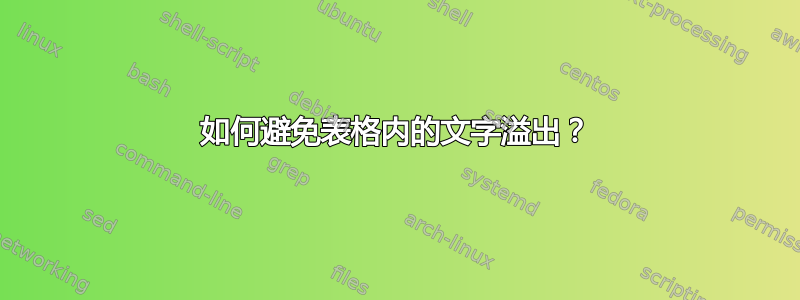
以下是使用的代码:
\begin{table}[h!]
\centering
\begin{tabular}{c c c}
\hline
\textbf{Chave} & \textbf{Valor} & \textbf{Descrição} \\
\hline
cables & 6 & Há seis condutores elétricos nesta linha elétrica.\\
\hline
frequency & 50 & Indica que a frequência da linha são 50Hz. \\
\hline
power & line & Trata-se de uma linha aérea. \\
\hline
source & bing & Fonte de onde a informação foi obtida. Foi usado o \emph{Bing imagery} para preencher as outras tags. \\
\hline
voltage & 400000;150000 & Indica que há dois níveis de tensão na linha, um de 400kV e outro de 150kV. \\
\hline
wires & double & O número de circuitos trifásicos (três condutores) por linha elétrica. Há dois circuitos trifásicos. \\
\hline
\end{tabular}
\caption{\emph{Tags} da linha de alta tensão \emph{144632829}. Quantas mais \emph{tags} um objeto tiver, mais informação consegue-se extrair desse objeto.}
\label{tabela_2}
\end{table}
输出如下:
文本正在离开页面。我该如何避免这种情况?
答案1
@barbarabeeton 在评论中提供的链接应该可以很好地概述您可用的选项。要使用其中一个选项:我建议您加载表格型包,使用其tabularx环境,将表的目标宽度设置为\textwidth,并使用X第三列的列类型;换行将发生在最后 3 行。进行这些更改的结果(修复了最紧迫的格式问题)显示在下面的第一个表中。
\hline此外,我建议你通过删除大部分用宏绘制的线条,让表格看起来更加开放和吸引人。书签其余三行代码的封装;请参阅下面的代码以了解该想法的实现。接下来,你真的需要大胆的标题行中的材料?使用\qty宏(由希尼奇包)来排版数量和相关的科学单位将增添一抹亮色,就像在第三列中提供连续行的自动悬挂缩进一样。进行这些额外更改的结果显示在下面的第二个表中。
\documentclass{article}
\usepackage[T1]{fontenc}
\usepackage[portuguese]{babel} % or 'brazilian'?
%\usepackage{newpxtext,newpxmath} % optional
\usepackage{tabularx} % for 'tabularx' env. and 'X' column type
\usepackage{ragged2e} % for '\RaggedRight' macro
%% 'X' column type with automatic hanging indentation and no
%% full justification:
\newcolumntype{L}{>{\RaggedRight\hangindent=1.5em\hangafter=1}X}
\usepackage{booktabs} % for well-spaced horizontal rules
\usepackage{siunitx} % for '\qty' macro; see https://ctan.org/pkg/siunitx
\begin{document}
\begin{table}[h!]
%% first (minimalist) version: employ a 'tabularx' environment
\begin{tabularx}{\textwidth}{c c X}
\hline
\textbf{Chave} & \textbf{Valor} & \textbf{Descrição} \\
\hline
cables & 6 & Há seis condutores elétricos nesta linha elétrica.\\
\hline
frequency & 50 & Indica que a frequência da linha são 50Hz. \\
\hline
power & line & Trata-se de uma linha aérea. \\
\hline
source & bing & Fonte de onde a informação foi obtida. Foi usado o \emph{Bing imagery} para preencher as outras tags. \\
\hline
voltage & 400000;150000 & Indica que há dois níveis de tensão na linha, um de 400kV e outro de 150kV. \\
\hline
wires & double & O número de circuitos trifásicos (três condutores) por linha elétrica. Há dois circuitos trifásicos. \\
\hline
\end{tabularx}
\bigskip\bigskip
%% second version: apply further tweaks
\begin{tabularx}{\textwidth}{@{} l l L @{}}
\toprule
Chave & Valor & Descrição \\
\midrule
cables & 6 & Há seis condutores elétricos nesta linha elétrica.\\
frequency & 50 & Indica que a frequência da linha são \qty{50}{\hertz}. \\
power & line & Trata-se de uma linha aérea. \\
source & bing & Fonte de onde a informação foi obtida. Foi usado o \emph{Bing imagery} para preencher as outras tags. \\
voltage & 400000;150000 & Indica que há dois níveis de tensão na linha, um de \qty{400}{\kilo\volt} e outro de \qty{150}{\kilo\volt}. \\
wires & double & O número de circuitos trifásicos (três condutores) por linha elétrica. Há dois circuitos trifásicos. \\
\bottomrule
\end{tabularx}
\caption{\emph{Tags} da linha de alta tensão \emph{144632829}. Quantas mais \emph{tags} um objeto tiver, mais informação consegue-se extrair desse objeto.}
\label{tabela_2}
\end{table}
\end{document}




